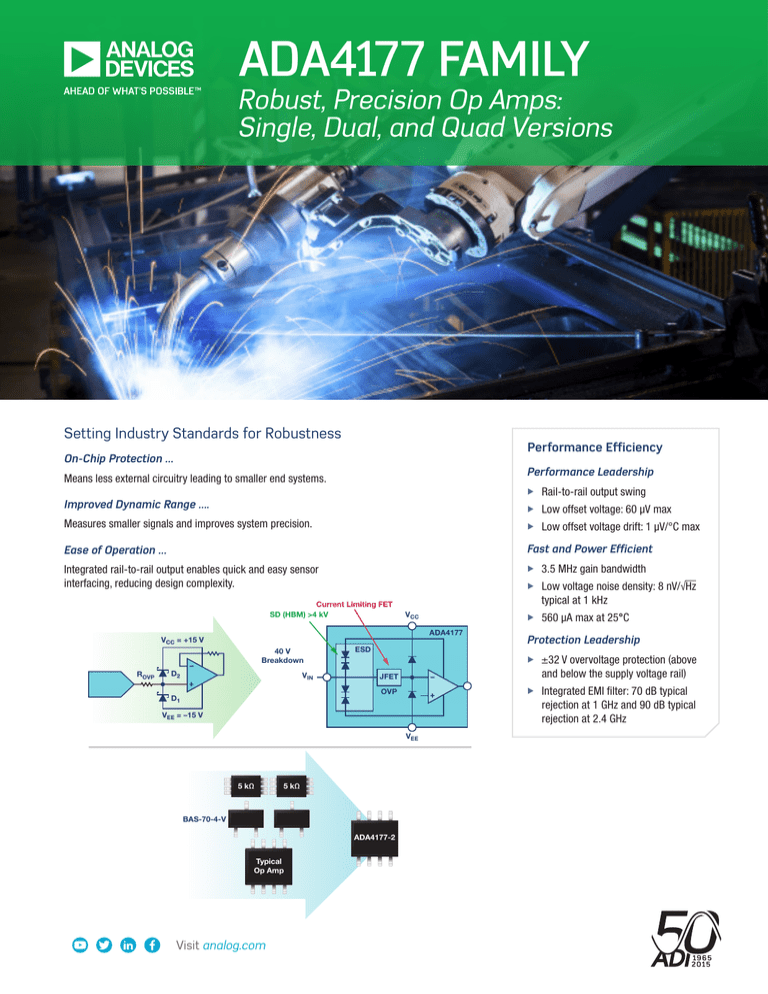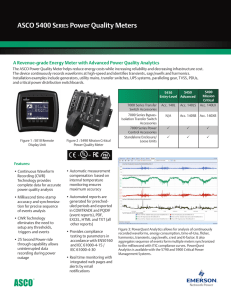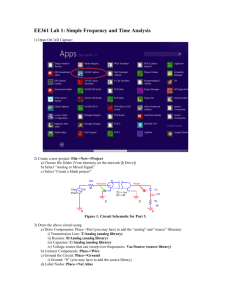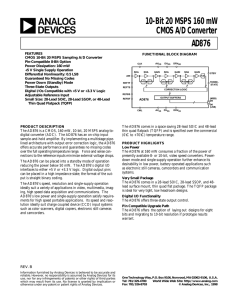ADA4177 FAMILY Robust, Precision Op Amps: Single, Dual, and Quad Versions
advertisement

ADA4177 FAMILY Robust, Precision Op Amps: Single, Dual, and Quad Versions Setting Industry Standards for Robustness Performance Efficiency On-Chip Protection … Performance Leadership Means less external circuitry leading to smaller end systems. XX Improved Dynamic Range …. Rail-to-rail output swing XX Low offset voltage: 60 µV max Measures smaller signals and improves system precision. XX Low offset voltage drift: 1 µV/°C max Ease of Operation … Fast and Power Efficient Integrated rail-to-rail output enables quick and easy sensor interfacing, reducing design complexity. XX 3.5 MHz gain bandwidth XX Low voltage noise density: 8 nV/√Hz typical at 1 kHz XX 560 µA max at 25°C Current Limiting FET SD (HBM) >4 kV ADA4177 VCC = +15 V 40 V Breakdown ROVP VCC D2 VIN ESD VEE = –15 V VEE 5 kΩ 5 kΩ BAS-70-4-V ADA4177-2 Typical Op Amp Visit analog.com XX ±32 V overvoltage protection (above and below the supply voltage rail) XX Integrated EMI filter: 70 dB typical rejection at 1 GHz and 90 dB typical rejection at 2.4 GHz JFET OVP D1 Protection Leadership Overview The ADA4177 family is composed of low noise, low bias current op amps with overvoltage and electromagnetic interference (EMI) protection. With single, dual, and quad versions, they all offer ±32 V input over voltage protection (OVP) on-chip, leading to a reduced bill of materials cost and board space by eliminating the need for external OVP discretes. With the dual advantage of simplifying system design and making the end system easier to pass EMI susceptibility testing by including integrated EMI filtering on inputs, the parts meet an impressive 70 dB of rejection at 1000 MHz. For precision instrumentation, end systems can be made smaller due to the integrated OVP and EMI. There is no need to calibrate the system over time or temperature change leading to increased uptime and reduced cost of ownership. This is due to the ultralow offset voltage and drift specifications. For the ultimate end system precision and linearity, features such as the rail-to-rail output adds value for designers that need additional dynamic range to measure the smallest level signals. Low noise performance complemented by excellent dc precision and ac accuracy specifications minimize the need for design trade-offs, especially for small form factor end systems where low power dissipation is needed. For process control sensor interfaces such as thermocouples, RTDs, and strain gages, the sensor may be off board exposing the op amp inputs to overvoltage and EMI. Therefore, the on-chip robust protection is a key advantage in space constrained modules. The ADA4177 family robust inputs combined with low supply current and consistent specification over a wide range allows them to be used as input module front-end amplifiers with signal swings compatible to industry standards, and especially for small form factor, USB-powered applications where low power and small packages are critical. The drive for increased productivity within all industrial environments is driving PCL and DCS systems to incorporate more and more channels to facilitate more process node monitoring. The multichannel versions lead to greater efficiencies within the end system, which ultimately lower the cost of the system and simplify design. The ADA4177 Family Advantages XX XX Single, dual, and quad models available (ADA4177-2, ADA4177-2, ADA4177-4) Reduces design and layout complexity; removes the complexity of developing protection circuitry XX Reduces PCB system board area XX Reduces design time and ultimately time to market. Robust, Precision Op Amps XX XX XX XX XX Gain bandwidth product (AV = +100): 3.5 MHz typical Unity-gain crossover (AV = +1): 3.5 MHz typical −3 dB bandwidth (AV = +1): 6 MHz typical Overvoltage protection to 32 V above and below the supply voltage rail Integrated EMI filters Analog Devices, Inc. Worldwide Headquarters Analog Devices, Inc. Europe Headquarters Analog Devices, Inc. Japan Headquarters Analog Devices, Inc. Asia Pacific Headquarters Analog Devices, Inc. One Technology Way P.O. Box 9106 Norwood, MA 02062-9106 U.S.A. Tel: 781.329.4700 (800.262.5643, U.S.A. only) Fax: 781.461.3113 Analog Devices, Inc. Wilhelm-Wagenfeld-Str. 6 80807 Munich Germany Tel: 49.89.76903.0 Fax: 49.89.76903.157 Analog Devices, KK New Pier Takeshiba South Tower Building 1-16-1 Kaigan, Minato-ku, Tokyo, 105-6891 Japan Tel: 813.5402.8200 Fax: 813.5402.1064 Analog Devices 5F, Sandhill Plaza 2290 Zuchongzhi Road Zhangjiang Hi-Tech Park Pudong New District Shanghai, China 201203 Tel: 86.21.2320.8000 Fax: 86.21.2320.8222 XX 70 dB typical rejection at 1000 MHz XX XX 90 dB typical rejection at 2400 MHz Offset voltage (max): 60 µV XX Offset voltage drift (max) : 1 µV/°C XX Voltage noise(typ): 8 nV/√Hz Input bias current (max): 1 nA XX XX Signal voltage gain (AVO): 100 dB minimum over full supply ©2015 Analog Devices, Inc. All rights reserved. Trademarks and registered trademarks are the property of their respective owners. Ahead of What’s Possible is a trademark of Analog Devices. PH13329-0-6/15 analog.com





